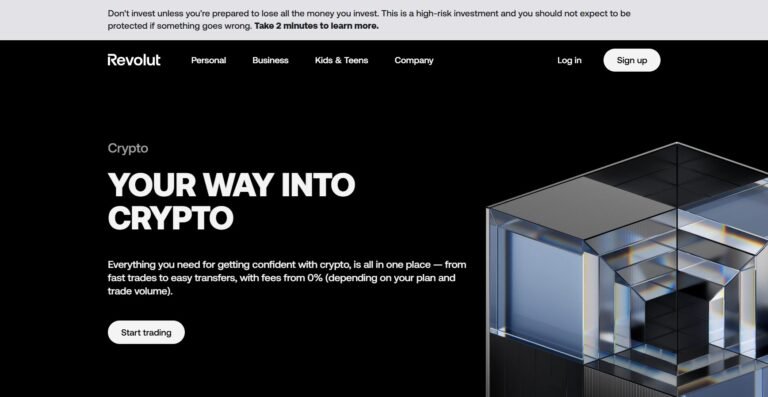Table of Contents
Introduction to Revolut
This article offers a comprehensive Revolut review addressing concerns around the platform, including the Revolut scam rumors circulating in crypto communities. Revolut, originally known as a digital banking and financial app based in the UK, has expanded into cryptocurrency trading services, offering users access to buying, selling, and holding various digital coins.
While Revolut boasts regulated operations in the UK and European Economic Area, questions remain whether its cryptocurrency services meet the expectations of transparency and security. This raises the important question: is Revolut a scam or a reliable platform for crypto trading? This Revolut review explores all essential factors to help you decide.
Our focus is to inform users who might feel cheated or suspicious about Revolut’s crypto offerings—whether you are a victim seeking clarity or a cautious investor researching before committing your funds.
Revolut: Regulation & Legal Status
Revolut operates under strict regulation as an electronic money institution authorized by the UK’s Financial Conduct Authority (FCA). This regulation extends some consumer protections, though cryptocurrency assets themselves are not regulated financial products in most jurisdictions, including the UK.
It is crucial to distinguish that Revolut’s crypto service is more akin to a custodial wallet and exchange rather than a traditional brokerage. There are no misleading claims about top-tier broker licenses such as ASIC or CySEC, but users should understand the limited scope of crypto regulation.
To better understand how to spot suspicious crypto services, you can visit resources like learn how to spot a scam broker before it’s too late. Despite Revolut’s regulatory compliance, some users still question if Revolut is a scam due to customer service and withdrawal concerns.
Trading Conditions & Platform Analysis of Revolut
Revolut provides a simple crypto trading experience without offering margin trading, leverage, or spreads typical in forex or CFD brokers. The minimum transaction size varies but generally starts at small amounts, making it accessible for beginners.
The platform supports a limited number of cryptocurrencies with easy-to-use mobile and web interfaces. However, Revolut does not provide full blockchain wallets for users; instead, users hold crypto “exposure” that cannot be transferred outside the Revolut ecosystem, which some traders may find restrictive.
Users should be aware that Revolut does not offer MT4 or MT5 trading platforms, and the absence of decentralized exchange capabilities limits control over private keys. If you want to know what to check before signing up with a trading platform, be cautious about these limitations. Such gaps lead to skepticism over whether Revolut might be a fraud.
Reputation & User Reviews About Revolut
Revolut has millions of users worldwide, with a generally positive reputation for its fintech services. However, cryptocurrency users have reported mixed experiences. Common complaints include delayed transaction processing, difficulty withdrawing crypto to external wallets, and unresponsive customer support.
Some online review sites like Trustpilot show numerous positive reviews but also indicate suspiciously repetitive or generic testimonials, making it challenging to separate genuine feedback from potential manipulation.
Traffic analysis shows strong app adoption but does not directly correlate with crypto platform reliability, urging users to carefully weigh community reviews. These concerns prompt the question of whether Revolut is a scam or simply a limited crypto service.
How to Test Whether Revolut Is a Scam
When assessing Revolut or any crypto platform, start by verifying its licenses with official authorities such as the SEC or FCA. Revolut’s electronic money license is valid, but remember that cryptocurrencies themselves remain largely unregulated.
Watch for warning signs like vague terms, poor transparency about crypto custody, or overly positive user reviews with no critical voices. Check real user forums and complaint boards for reports of withdrawal issues or platform outages.
Testing the platform firsthand with a small deposit or demo (if available) can reveal operational realities. Also, carefully review withdrawal policies to avoid surprises. Avoid platforms promising guaranteed profits or no-risk investments, as these claims are never legitimate.
For additional support, consider using the FTC’s fraud reporting tool to flag suspicious behavior.
Final Verdict & Alternatives
Revolut is a regulated fintech platform with legitimate crypto trading services, but it is not without limitations. The lack of blockchain wallet control and occasional customer service complaints may frustrate some users, especially those expecting full crypto exchange capabilities.
If these downsides outweigh your needs, consider alternatives like Coinbase, Kraken, or Binance—regulated exchanges offering broader crypto services and wallet control.
Always prioritize trading on licensed and transparent platforms to protect your investments and avoid falling victim to crypto fraud. Whether Revolut is a scam or not depends largely on your expectations and understanding of its scope as a crypto service.



